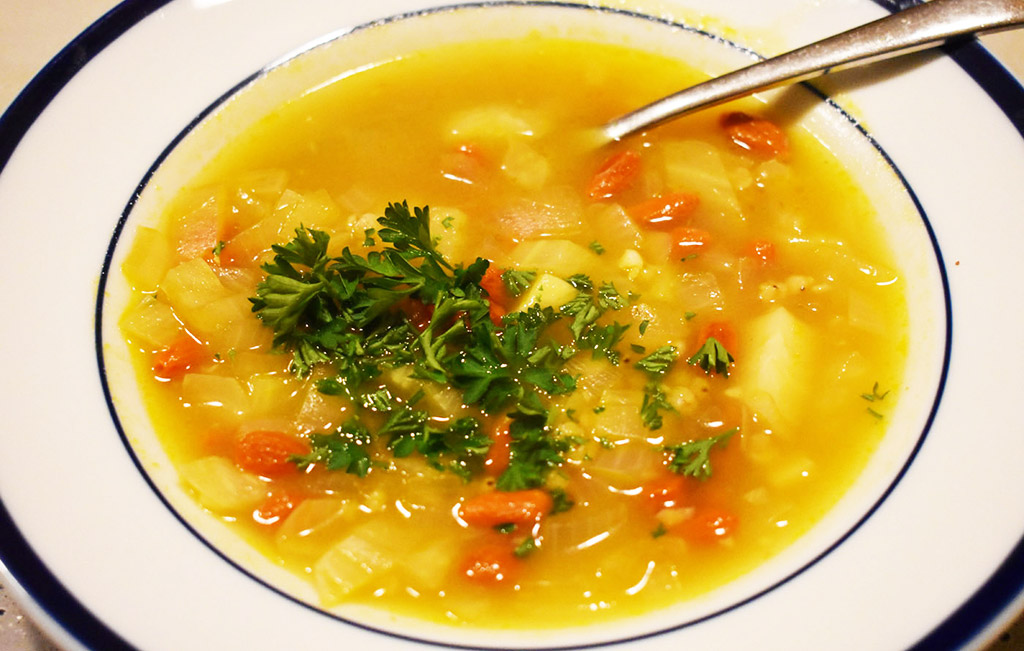
When I was looking through my cookbooks and magazines for Thanksgiving ideas, I stumbled upon several recipes that looked so unusual that I marked them for trying later on. Goji-Saffron Soup with Sorghum is one of the recipes that made the list. I found this soup in Vegetarian Times, but the original recipe comes from a book titled Superfood Soups by Julie Morris.
I would never have thought to put goji berries in soup. Smoothies, yes; soup, not so much. But the combination worked. This soup is an elegant, brothy starter, or with a green salad or roasted vegetables, can be a light but warming meal.
Sorghum is a chewy grain with origins dating back to 8,000 BCE. Now the U.S. is the biggest producer of sorghum. Here it is mostly used as a component of livestock feed. In recent years, sorghum has regained popularity among human consumers of fine foods because of its nutritional gifts. It’s gluten free and high in unsaturated fats, protein, and minerals. Sorghum has more antioxidants than blueberries and pomegranates.
Sorghum is also environmentally friendly. it is among the most efficient crops in terms of conversion of solar energy and use of water and is known as a high-energy, drought-tolerant crop.
Goji-Saffron Soup with Sorghum
Makes 7 cups / 4 servings
- 6 cups vegetable broth (low-sodium store-bought variety), divided
- 1 pinch saffron
- 2 Tbsp olive oil
- 1 medium yellow onion, finely diced
- 1 medium fennel bulb, finely diced
- 3 cloves garlic, minced
- 2 bay leaves
- ½ cup dried goji berries
- 1 cup cooked sorghum
- 1 cup dry white wine
- ½ tsp sea salt, or to taste
- 2 Tbsp minced fresh parsley, divided
Put It Together:
- In a small pot, bring 1 cup of the vegetable broth to a simmer. Remove from the heat. Finely crumble the saffron threads by hand (or grind them in a mortar and pestle—the finer they’re ground, the better the flavor), and stir them into the broth. Let the broth sit while you continue to make the soup.
- In a separate heavy-bottomed large pot, warm the oil over medium heat. Add the onion and fennel, and cook for 5 minutes, stirring occasionally.
- Mix in the garlic, and cook for a couple of minutes longer to allow the vegetables to lightly caramelize.
- Stir in the bay leaves, goji berries, and cooked sorghum, and then add the wine, saffron broth, remaining vegetable broth, and ½ teaspoon sea salt. Bring to a boil over high heat, then reduce the heat to medium-low, cover, and cook for 30 minutes.
- Discard the bay leaves, stir in 1 tablespoon of the parsley, and adjust the salt to taste. Ladle the soup into bowls, and sprinkle the remaining parsley on top.
Cooking Sorghum: Place 1 cup dry sorghum in a medium pot and cover with water, 2 inches above the grain. Bring the water to a boil and then reduce the heat to a simmer and cook for 45–75 minutes (time will vary depending on the freshness of the grain, but it usually takes about 1 hour). The grain is cooked through when it is soft but still has a bit of a chew (the consistency is similar to wild rice). Drain off any excess water. 1 cup dry sorghum = 2 cups cooked sorghum
